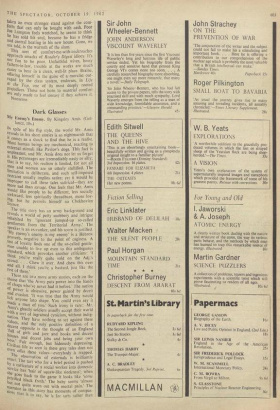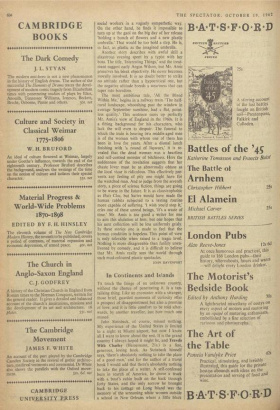Dark Glasses
IN spite of his flip style, the world Mr. Amis reveals in his short stories is so nightmarish that it comes as a shock to find that he is a realist. Most human beings are mechanical, reacting to external stimuli like Pavlov's dogs. This fact is Unpleasant, and Mr. Amis does not let us forget it His personages are irremediably nasty or silly; that is to say, his realism is limited, for not all men and women are so utterly stultified. The limitation is deliberate, and such self-imposed restraint usually implies satire; yet it would be improper to call these tales satirical—they are more sad than savage. One feels that Mr. Amis Would like people to be different, less socially awkward, less spiritually threadbare, more lov- ing; but he permits. himself no Chekhovian licence.
The title story has an army background and reveals a world of petty snobbery and intrigue inhabited by 'ignorant jumped-up so-called gentlemen from the. Territorial Army.' The speaker is an ex-ranker, and his scorn is justified. `MY enemy's enemy is my enemy' is a Hebrew proverb, negative to the point of caginess. A test of loyalty finds one of the so-called gentle- men unable to live up even to this ambiguous standard, which provokes another criticism : 'I think you're really quite sold on the Adj.'s crowd. • • . Chew it over. And chew this over and all. I think you're a bastard, just like the rest of them.' There are two more army stories, each on the - theme that 'the Army,puts power into the hands of chaps who've never had it before.' The notion of Power is obsessive, power gained by deceit and evasion. 'it was true that the Army would lick anyone into shape. You could even say it made a man of you.' Such irony is rare: Mr. Anus's ghastly soldiers usually accept their world with a sort of ingrained cynicism, without indig- nation. They have nothing to set against these values, and the only positive definition of a decent opposite is the thought of an England full of girls and jazz and books and decent neuses and decent jobs and being your own boss,' Fair enough, but hideously depressing. Civilian life as seen in these grey tales does not even offer these values—everybody is trapped. The observation of externals is brilliantly exact. The tart who for a brief period is pushed by a caricature of a social worker into domestic service has 'hair of squaw-like sleekness'; when he goes back to the game it looks like 'some petrified black froth.' The baby seems 'almost but not quite worn out with mortal pain.' The narrator in this story has moments of compas- sion; that is to say, he is for tarts rather than social workers in a vaguely sympathetic way. On the other hand, he finds it impossible to turn up at the gaol on the big day of her release 'holding a bunch of flowers and a new plastic umbrella.' That would be too bold a step. He is, in fact, as plastic as the imagined umbrella.
Another story describes with awful skill a disastrous evening spent by a typist with her boss. The title, 'Interesting Things,' and the treat- ment suggest early Angus Wilson, but Mr. Amis preserves his bleak objectivity. He never becomes morally involved. It is no doubt better to strike no attitude rather than a hypocritical one, but the negative attitude breeds a weariness that can taper into boredom.
The most ambitious tale, 'All the Blood Within Me,' begins in a railway train. 'The half- rural landscape, whooshing past the window in average September sunshine, had a flat, point- less quality.' This sentence sums up perfectly Mr. Amis's view of England in the 1960s. It is a fitting background for his characters, who lack the will even to despair. The funeral to which the train is bearing two middle-aged men is of the woman with whom one of them has been in love for years. After a dismal lunch finishing with 'a round of liqueurs,' it is re- vealed that the dead woman was a heartless and self-centred monster of bitchiness. Here the suddenness of the revelation suggests that her chaste lover must be as abnormally obtuse as the local vicar is ridiculous. This effectively pre- vents any feeling of pity one might have for the wretched man. And to judge from the seventh story, a piece of science fiction, things are going to be worse in the future. It is as claustrophobic as Huis Clos, but Sartre would have made the human rabbits subjected to a testing routine more capable of suffering. 'I wish you'd stop it,' cries one of these unreal beings, 'it's a waste of time.' Mr. Amis is too good a writer for one to aim this ululation at him; but one hopes that his next collection will be less uniformly grisly. In these stories one is made to feel that the human condition is hopeless. This point of view is only tolerable when raised to a tragic level. Nothing is more disagreeable than futility unen- livened by comedy, and it is difficult to believe that Mr. Amis really sees the world through such mud-coloured plastic spectacles.
JOHN DAVENPORT















































 Previous page
Previous page